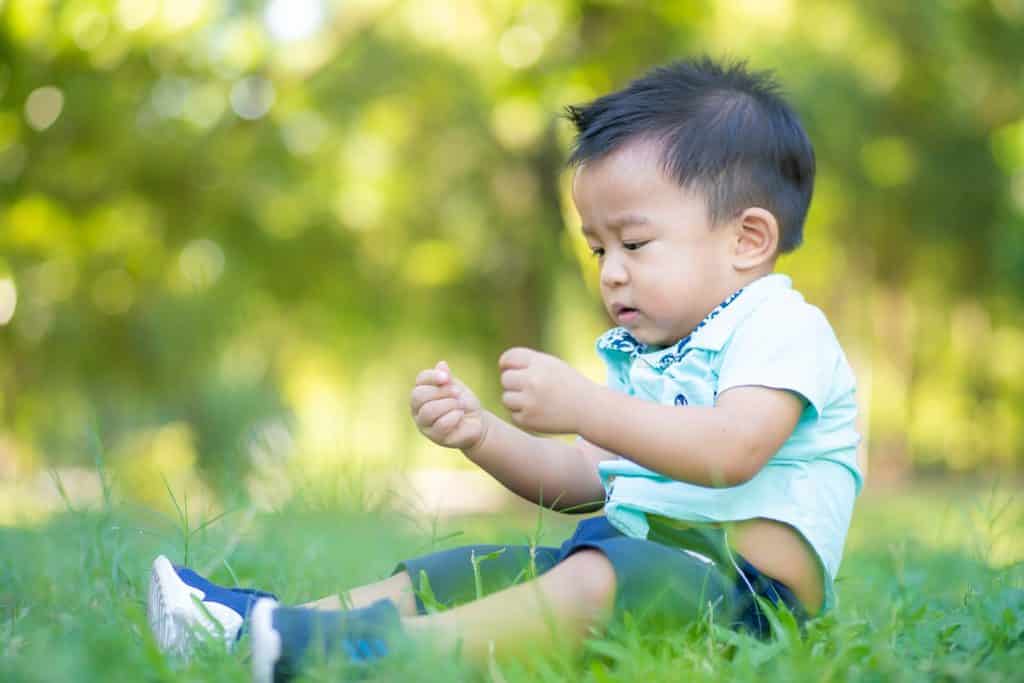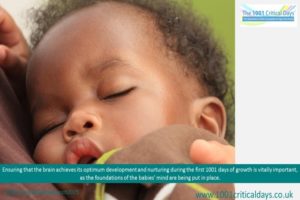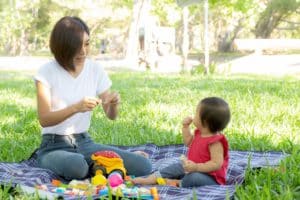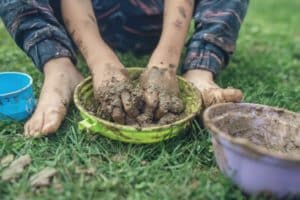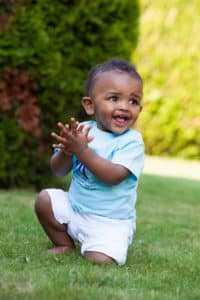Children under two belong outside
(Jim Greenman 1988)
We think that the outdoors is very important for everyone, especially young children, so we devised a course to share what we have learned over the years. The course is called OWL Babies – Outdoors While Learning.
We have put together some information for you from reports and research that underpins the OWL Babies course, as well as all our other sessions and courses for young children.
OWL Babies is our 6 week course of outdoor adventures for babies under 6 months that supports and enhances a baby’s brain development.
Share with your baby the pleasure, delight and discovery of the great outdoors!
The first 1001 days
The first 1,001 days of life are the brains window of opportunity and the evidence shows that:
- Ensuring that the brain achieves its optimum development and nurturing during this peak period of growth is vitally important, and enables babies to achieve the best start in life.
- From birth to age 18 months, connections in the brain are created at a rate of one million per second! The earliest experiences shape a baby’s brain development, and have a lifelong impact on that baby’s mental and emotional health.
Research tells us that re-connecting with nature supports physical and mental health in adults and children, an opportunity to develop and strengthen the attachment with your baby.
A baby’s brain absorbs a lot more than we may realize as they try to make sense of the world, soaking up noises, sights and experiences around them. Being outside is an important tool in activating brain development, Nature supports a baby’s full sensory development what they see, hear and feel outdoors, they use their whole bodies and whole self to explore, gain confidence and a sense of wellbeing. With so much to hear and see outside Nature exercises a baby’s brain and helps develop the memory needed to continue to use and keep brain cells.
There is no better place than outside to stimulate the Vestibular system through child led play.
This sense lets you know where your body is in relation to the environment, so rock, swing, spin, twirl, tip, teeter, jiggle, wobble, slide, bounce, be upside down and otherwise get dizzy!!
It also improves visual tracking and hand/eye coordination which is the foundation for things like:
- Reading and scanning lines of text
- Mark making and hand writing
- Learning to walk
- Independence skills like getting dressed
- Language development
- Developing muscle tone and self-regulation
Visual tracking of birds in the sky, planes flying overhead, the movement of the leaves in the tree tops and looking at the edge of things helps the development of the brain connections needed for vision.
Myopia (short-sightedness) is becoming more common and a protective factor of Myopia development is time spent outdoors. (Chris Hammond, Professor of Ophthalmology at Kings College, London and consultant ophthalmic surgeon at St Thomas’s Hospital)
Recent research tells us visual opportunities for far distance vision that can only happen outside help prevent Myopia.
Dirt on my shirt
There’s dirt on my shirt
And leaves in my hair
There’s mud on my boots
But I don’t really care
Playing outside is so much fun
To breathe the clean air
Feel the cool rain
And the warm sun
To stomp in a puddle
Or climb a big tree
Makes me quite happy
Just look and you’ll see
Even the very youngest baby responds to the feel of the breeze and the movement of light through leafy branches.
With so many advantages to Nature and the outdoors what are we waiting for?! With your baby’s brain growing at a rapid rate they haven’t got time to wait for a fine sunny day, let’s get outside whatever the weather and take advantage of what Nature can do for us all. You don’t need to provide any toys or gadgets just your face and the wonderful world of Nature, even the very smallest patch of grass, a single tree, a cultured rose or just the humble dandelion is supporting your baby’s developing brain and bringing you and your baby closer together, NATURE WILL NURTURE.
If a child is to keep alive their inborn sense of wonder – they need the companionship of at least one person who can share it, rediscovering with them the joy, excitement and mystery of the world we live in. (Rachel Carson, 1998)
Dirt and the Brain!
Studies have shown dirt to be good for your brain!
Apparently, there are types of bacteria that are naturally found in soil which activate the neurons that produce serotonin – a key chemical in many bodily functions, as well as a natural anti-depressant.
In other words, dirt can actually help make you feel happy!
(Bristol University and University College London – Dr. Chris Lowry 2007 – www.livescience.com)
FIVE TO THRIVE – The things you do every day to help your child’s growing brain (Kate Cairns Associates)owl babies 3 (1)
Your child’s body grows better when you give them good food.
Your child’s brain grows better when you do five simple things that feed the growing brain:
Respond Cuddle Relax Play Talk
These are your child’s daily ‘five to thrive’ – the building blocks for a healthy brain. A healthy brain will help your child be happy in themselves, make friends and enjoy their family, as well as being the best start for learning once they go to school. Every day will bring many opportunities to give your baby’s brain what it needs to grow well.
Just think about this:
- How many times have you responded to your baby’s needs today?
- How many times have you cuddled your baby today?
- How many times have you soothed your baby today?
- How many times have you been playful with your baby today?
- How many times have you communicated with your baby today?
You have been building your baby’s brain without even knowing it!
Emotional nurture (Five to Thrive) is as important in feeding the brain as physical nurture (Five a Day)
Before independence comes dependence, the more you tune into your baby and strengthen your attachment and bond the more secure and resilient they will grow up to be.
If you would like to join our next OWL Babies course please check our timetable for dates.
OWL Babies is underpinned by the following publications, reports and research:
- The 1001 Critical Days – cross party manifesto
- Five to Thrive – Kate Cairns Associates
- Sue Gerhardt – Why Love Matters
- Margot Sunderland – What Every Parent Needs to Know
- Early Years Alliance Publication
- Dr. Chris Lowry – Research at Bristol University and University College London, Depressed? Go play in the dirt
- Chris Hammond – Professor of Ophthalmology at Kings College, London has written various report and gave this TED Talk
- Conclusions reached in Royal Foundation of the Duke and Duchess of Cambridge report on The State of the Nation: Understanding Public Attitudes to the Early Years
- Here is a shorter example of the video, from Siren Films, families are shown during the course, Babies Outdoors – Bobby Plays in the Garden


